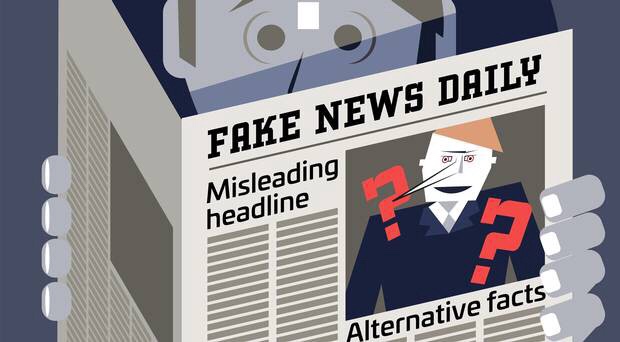Because of current medical, legal, and Constitutional issues in the news these days, we have been inundated with ‘expert’ analyses. People with more initials after their name than a can of SpaghettiOs. Masters. PhDs. Medical journals. Constitutional ‘scholars’. That their earlier opinions wound up flat-out wrong doesn’t seem to affect the media’s love of such ‘experts’. But what this trend has revealed, at least to me, is the complete lack of objective thinking, especially by said media. Let’s dig.
In the old days, prior to 24-hour cable news networks and the Internet, there were two distinct flavor of topical television shows: news and opinion. The news, usually an hour in the morning, and an hour in the evening, 5 or 6pm, was nothing more than a recitation of what actually happened, that day or the prior day. We had stoic, nearly monotone, news anchors, that were respected and trusted, nearly universally. We had NO IDEA what their politics were, because they kept such views to themselves. They didn’t feel their opinion was any part of their job descriptions. As Joe Friday would say, “Just the facts, ma’am.” Completely separate from news programming, we had opinion shows. These folks had definite opinions, and wanted to convince you to join them on their side of issues. William F. Buckley was a deliberate, open Conservative—he tried to elicit agreement with that stance with data, facts, and reasoning. Phil Donahue had a talk show, with a distinctly Liberal slant. Again, he tried to explain his point of view with his own logic and compassion. Neither Buckley or Donahue would ever consider themselves ‘news people’. Those lines simply did not cross—you were either a ‘news’ show or a ‘commentary’ show.
Newspapers were organized much the same way: front page articles were ‘news’, editorial page articles were ‘opinion’. Editors were quite diligent in keeping those two functions completely separate. In addition, newspapers had a third function: investigative reporting. Since papers were not limited to time of audience, they were perfect for deep-dives into specific topics. If the topic was broad enough or interesting enough, it may generate its own section of the paper! The investigative reporter was a rare breed. He or she would dig deep into a specific story, personally interviewing as many people as necessary to get to the bottom of a topic. The more controversial the topic, or the more secretive, the more digging was required to explain and report the story. Many of these reporters risked their own health and life, reporting on stories powerful and dangerous people did not want the public to know about. But one thing was constant for the investigative reporters: they did their own research, their own interviews, their own culling of experts in a myriad of specialty fields—all to get the necessary info to MAKE THE STORY. The truly great reporters of this type were not only fearless and determined, but they also were true wordsmiths. They could make very complicated subjects understandable for the masses, simply by crafting the results of their investigations into stories of common language.
Fast forward to today. With the advent of 24-hour news channels and Internet postings, ‘news’ is now quite a bit different than in the past. Unfortunately, the distinct line between ‘news’ and ‘opinion’ is virtually gone. Many ‘news’ outlets report stories in such a way as to promote their own opinion of a given story—facts are no longer necessary. While opinion shows still exist, mainly on cable channels, the functions that used to be separate are now interwoven into newscasts. We know exactly what the political leanings are for each news anchor, because they make no effort to hide them. Gone are the folks that just tell us what happened—now, they tell us how we should feel about what happened—if they cover a story at all. An astounding level of ‘news’ simply does not get covered at all. Whether it is ‘editorial discretion’ or a bit more calculated, only showing the news they WANT reported, is anyone’s guess. But the real change from the ‘old days’ to now: investigative reporting doesn’t exist. No ‘journalists’ seem interested in interviewing experts, other than the same ones everyone else is using. They do not seem to read the studies or review the pertinent facts of a story at all. They seem content to report what other reporters are saying—about everything. This explains the near lock-step conformity to news reporting. We are now getting just opinions of opinions. Which is how we got nearly three solid years of President Donald Trump colluding with Russia stories, from all networks. That the Mueller Investigation found zero basis for such collusion is telling—all of the news outlets simply reported the same, poorly sourced, never verified ‘information’. Not one outlet questioned their now obviously erroneous sources. To dig, to do true due diligence, may have shot down the entire story line for over two years of reports! We see the same phenomenon in nearly every news cycle: from the racial strife of a few years ago (Trayvon Martin, Michael Brown, George Floyd, etc.), to the COVID-19 virus and its vaccines, the reports are nearly identical, across all outlets. It is most evident when they all recite the same exact ‘facts’, using the exact same phraseology (Trayvon was ‘hunted’ by George Zimmerman, Brown was a ‘gentle giant, soon to go to college’, etc.)—when those ‘facts’ are determined to be demonstrably false. How far does your imagination have to stretch to think that ALL outlets did their own interviews and data gathering, to all come to the same wrong conclusions, and all used the same phrases? Yeah. Again, we are getting opinions of opinions, and the source opinions are not only of the same people, they don’t seem terribly interested in accuracy or truth. Remember the old game ‘Telephone’, where people repeat the same story to each person down the line, the story changes bit by bit by the interpretations of the story from person to person—the story from the first person to the last is usually hilariously different? We are getting the same effect from our modern media. They are all in the same viewpoint, but with minor differences that are not relevant. If you want a story that isn’t a mainstream media view, good luck. Most times, we get better, broader, more accurate views of things from foreign news sources than domestic, which is a fairly sad state of affairs. Where did all of the investigative reporters of the past go? If we only had a true investigative reporter to look into that…
Thank you for taking the time to read my article! Feel free to add comments (good or bad) in the box below. In addition, there is a link at the bottom of the article to view other items I’ve written at Global Liberty Media. Enjoy!
Welcome!Log into your account
























